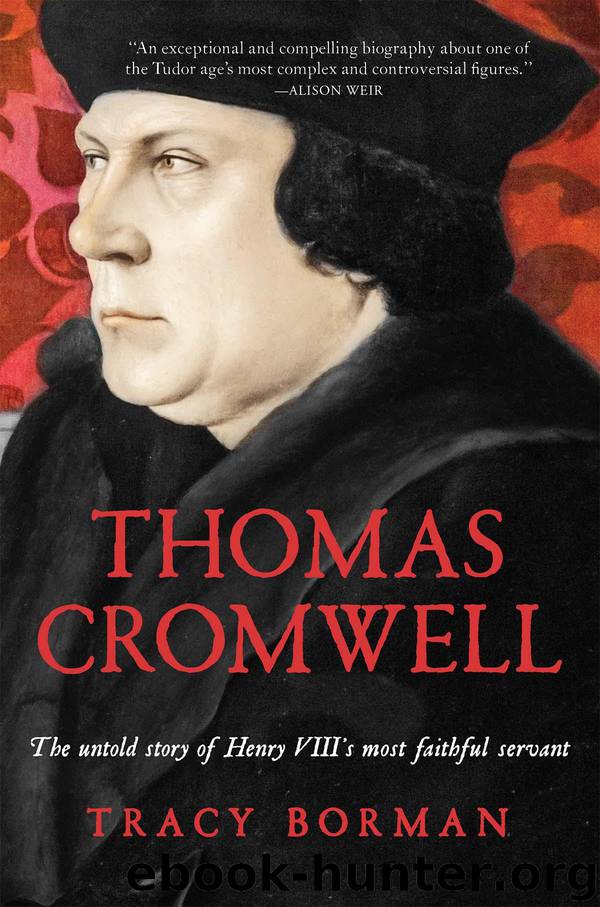Thomas Cromwell: The Untold Story of Henry VIII's Most Faithful Servant by Borman Tracy

Author:Borman, Tracy [Borman, Tracy]
Language: eng
Format: mobi
Publisher: Grove/Atlantic, Inc.
Published: 2015-01-05T16:00:00+00:00
CHAPTER 12
‘The Lady in the Tower’
According to Chapuys, what had made Cromwell resolve upon Anne’s destruction was not the open declaration of war which the Passion Sunday sermon had constituted, but the humiliating exchange with the king and ambassador on 21 April. This had made it clear how fragile Cromwell’s favour was, and how deftly Anne could still control her husband, urging him to favour a French alliance over an Imperial one. But Cromwell was not a man to act out of wounded pride alone. Although wracked with ‘disapointment and anger’ at the encounter with his royal master, he had ‘suddenly recovered his wits, and said that the game was not entirely lost, and that he had still hopes of success.’1 The ambassador soon learned of the game that Cromwell had in mind.
Cromwell had come to realise that an alliance with Charles V could be just as disastrous to his position as one with Francis I. The emperor hoped that his cousin Mary would inherit the throne of England, and he shrewdly observed to Chapuys that the best chance of achieving this would be to ensure Henry did not divorce Anne Boleyn: ‘To make the King give up his concubine, he might marry another, whereas it is certain he could have no issue from the concubine to hinder the succession of the Princess.’2 Perhaps it was his appreciation of this fact that motivated Cromwell to abandon his pro-Imperialist stance and work towards Anne’s destruction. Much as he might favour an alliance between Henry and Charles, if Mary succeeded to the throne it would spell disaster for his career. Indeed, given the antipathy that existed between them, it might well cost him his life.
Chapuys was very clear that it was Cromwell, not the king, who was responsible for everything that happened next. He told his master that the Lord Privy Seal ‘had planned and brought about the whole affair’.3 According to his report, after suffering the ‘unspeakable obstinacy of the King’, Cromwell had retreated to his house at Stepney and ‘taken to his bed from pure sorrow’.4 True, it had been a mortifying experience, but Cromwell was a hard-bitten courtier who had lived through far worse than that. He was not such a sensitive soul that he would need to retreat from court to lick his wounds – particularly as it took him almost a week to ‘recover’. More likely is that he used this time for an altogether darker purpose: to plot the queen’s downfall. Cromwell knew that he had to construct a watertight case against her: the fact that she had failed to give Henry a son was insufficient basis for a divorce. Neither could he find some religious justification to prove her marriage to the king had been invalid. This had worked ( just) for Catherine, but it would make a mockery of those tortuous divorce negotiations if the king’s second marriage had been dissolved on similar grounds. Besides, an annulment was not enough: to be sure of his own survival, Cromwell had to destroy Anne and her faction totally.
Download
This site does not store any files on its server. We only index and link to content provided by other sites. Please contact the content providers to delete copyright contents if any and email us, we'll remove relevant links or contents immediately.
| France | Germany |
| Great Britain | Greece |
| Italy | Rome |
| Russia | Spain & Portugal |
Fanny Burney by Claire Harman(25789)
Empire of the Sikhs by Patwant Singh(22176)
Out of India by Michael Foss(16313)
Leonardo da Vinci by Walter Isaacson(11912)
Small Great Things by Jodi Picoult(6101)
The Six Wives Of Henry VIII (WOMEN IN HISTORY) by Fraser Antonia(4795)
The Wind in My Hair by Masih Alinejad(4427)
The Lonely City by Olivia Laing(4122)
The Crown by Robert Lacey(4108)
A Higher Loyalty: Truth, Lies, and Leadership by James Comey(4037)
The Iron Duke by The Iron Duke(3642)
Millionaire: The Philanderer, Gambler, and Duelist Who Invented Modern Finance by Janet Gleeson(3573)
Sticky Fingers by Joe Hagan(3456)
Alive: The Story of the Andes Survivors by Piers Paul Read(3316)
Papillon (English) by Henri Charrière(3273)
Joan of Arc by Mary Gordon(3262)
Stalin by Stephen Kotkin(3089)
Aleister Crowley: The Biography by Tobias Churton(3024)
Ants Among Elephants by Sujatha Gidla(2927)
